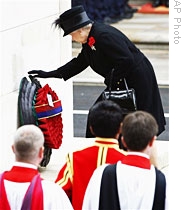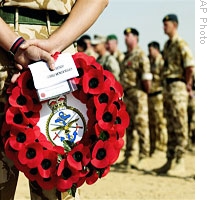London
09 November 2009
November 11 marks the anniversary of the end of World War 1. In Britain, a nearly 90-year old charity campaign originally started to support troops coming home from the 1st World War has taken on new life, with recent conflicts in Iraq and Afghanistan. The British Legion poppy appeal will distribute more than 30 million paper poppies, raising $50 million in aid of lost and injured servicemen and women.
 |
| Britain's Queen Elizabeth II lays a wreath at the cenotaph during the annual Remembrance Sunday ceremony, London, 08 Nov 2009 |
The Remembrance Day events commemorate all those lost in war. In recent years it has taken on particular significance.
A piper in full Scottish regalia is trying to attract attention for the poppy appeal. In the weeks leading to Armistice Day on November 11, volunteers blanket the country distributing red paper poppies for a donation. The symbol comes from a World War 1 poem by a Canadian military physician, lamenting the death of a friend, citing that on the battlefields where the dead lay, poppies still grew.
Thirty six-year-old Michael Newcomb sports a poppy on his lapel like millions of other Britons.
"It is an important tradition. A lot of people died. It is important to remember them and I think it is a very nice tradition," he said.
Across the capital, outside Westminster Abbey, a field is dotted with wooden crosses and giant wreaths of poppies in remembrance of 60,000 who died in wars in the past century; not just Britons, but also forces from Canada, Asia, Africa, and the Far East.
Author Kusoom Vadgama says soldiers and civilians from India played a huge role in the World Wars.
"Indians have contributed a tremendous amount of money, manpower, womenpower and dedication, and loyalty to the British people," said Vadgama.
World War 2 veteran Phil Berry landed on the beaches of Normandy, France 65 years ago. Phil Berry says the poppy appeal has long been part of his life and has new importance today.
"It is something that I have supported since I joined the army in 1942 to commemorate then those killed in the first world war, and then the second world war, and now again in Afghanistan," he said.
 |
| British Min. of Defense photo shows British and coalition forces taking part in Remembrance Sunday service in Helmand Province, Afghanistan, 08 Nov 2009 |
"No you never win in Afghanistan, never ever. Even in 100 years, you will never beat them," he said.
Britain is getting ready to welcome home its latest war dead from Afghanistan. The bodies of five men killed by an Afghan policeman they were training and that of a 6th, a soldier killed in an explosion.